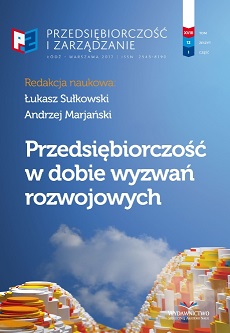Politykowanie organizacyjne a efektywność w kontekście improwizacji organizacyjnej
Organizational Politics and Firm Performance in Organizational Improvisation Context
Author(s): Monika Kulikowska-PawlakSubject(s): Business Economy / Management, Micro-Economics, Organizational Psychology, Human Resources in Economy
Published by: Społeczna Akademia Nauk
Keywords: organizational politics; innovativeness; corporate entrepreneurship; organizational improvisation;
Summary/Abstract: In the dynamic, discontinuous and undefined environment, organizations with a high degree of innovativeness and entrepreneurship focus on achieving high performance and value appropriation. Therefore, management theoreticians and practitioners are interested in discovering and then defining the determinants of enterprise innovativeness and organizational entrepreneurship. The research gap identified is successfully fulfilled by organizational politics. In the situation when resources are rare, goals are ambiguous, the ways of operation are non-formalized, and there is time pressure in the company, the intensity of political activity is increasing. These conditions are characteristic and even favourable to the usefulness of organizational improvisation. Against this backdrop, the main objectives of this paper are outlined and they include defining the impact of organizational politics on organizational effectiveness and the role of organizational improvisation in shaping the relationship between organizational politics and enterprise innovativeness and organizational entrepreneurship. The content of the study is contained in four basic passages. First, based on the critical review of the relevant literature, the theoretical foundations of organizational improvisation as a boundary factor of organizational politics are presented. Subsequently, a conceptual model was built and four research hypotheses were formulated. Next, the model was empirically tested on the sample of 158 small and medium-sized enterprises operating in Poland. Finally, the theoretical and practical implications of the revised model were shown and the main directions for further research were proposed.
Journal: Przedsiębiorczość i Zarządzanie
- Issue Year: 18/2017
- Issue No: 12.1
- Page Range: 77-89
- Page Count: 13
- Language: Polish

